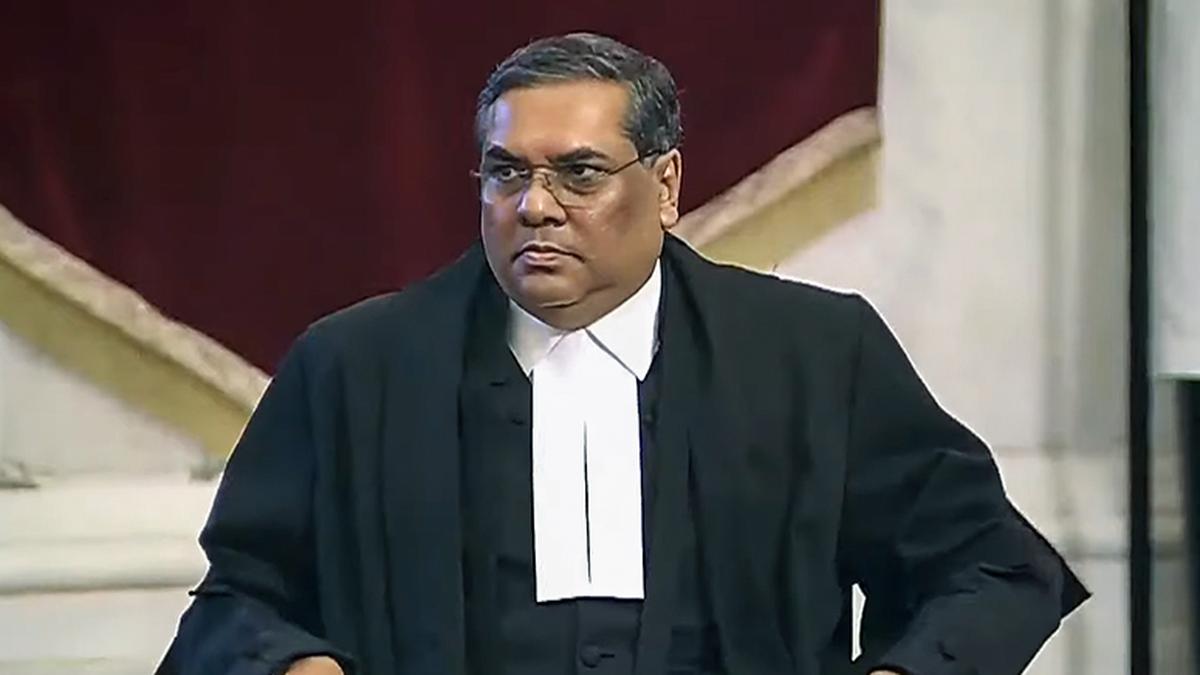
Chief Justice of India Sanjiv Khanna. | Photo Credit: ANI
Chief Justice of India (CJI) Sanjiv Khanna on Friday (November 21, 2024) said the idea of ‘socialism’ in India primarily meant a welfare state which provides equality of opportunity for all, and not a dictatorial dogma rammed down on citizens.
Heading a Bench comprising Justice Sanjay Kumar, the Chief Justice of India reasoned that the concept of socialism in India did not negate the participation of private players or negate individualism.
Watch: All about Justice Sanjiv Khanna, new Chief Justice of India
The Supreme Court was hearing a batch of petitions, one of them by BJP leader Subramanian Swamy, challenging the inclusion of the words ‘Socialist, Secular’ into the Preamble of the Constitution in 1976 with retrospective application. The petitioners has challenged the validity of Section 2 of the Constitution 42nd Amendment Act of 1976, and particularly the change in Preamble.
One of the petitioners argued that the dogma of socialism cannot prevail over other ideas, and it was wrong to force upon the nation one particular economic theory to achieve economic development.
“Socialism here means a welfare state where there should be equality of opportunity for all . It has never prevented the private sector from thriving here. We have all benefited from the private sector… The idea of socialism runs through many Articles of the Constitution,” Chief Justice Khanna responded.
Trial reforms, promotion of mediation among CJI Sanjv Khanna’s priorities
Advocate Ashwini Kumar Upadhyay, a petitioner, said the “Preamble is a statement of adoption of the Constitution by the Constituent Assembly on November 26, 1949 and cannot be changed as it is an unalterable fact”. The inclusion in the Preamble was done without States’ ratification, which reflected the ‘will of the people’. Mr. Upadhyay contended the changes made amounted to a “fraud on the Constitution”. He pointed out that the 42nd Constitution Amendment Act was passed in the thick of the Emergency days when the “voice of the people was silenced”.
But the Chief Justice firmly pointed out that socialism and secularism were part of the Basic Structure of the Constitution.
In a previous hearing, the CJI had made it clear that “secularism had always been part of the Basic Structure… If one looks right to equality and the word ‘fraternity’ used in the Constitution, there is a clear indication that secularism has been held as the core feature of the Constitution”.
Reacting to the argument that the Preamble was frozen in time could not have been altered through a Constitution Amendment, Chief Justice Khanna said the Preamble was “part and parcel of the Constitution”.
“Article 368 (power to amend the Constitution) extends to the Preamble. The Preamble is a part and parcel of the Constitution. It is neither alien nor separate from the Constitution,” the Chief Justice addressed the petitioners.
Though the Constitution was adopted on a particular date, November 26, 1949, it has also allowed room for amendments to realise its welfare goals of rights and welfare for its citizens, the court noted. The Bench reserved the case for orders on Monday (November 25, 2024.)
Published – November 22, 2024 03:07 pm IST


